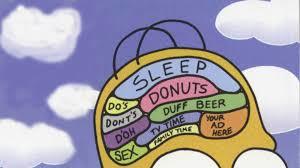Ricky Monahan Brown's Blog, page 5
July 19, 2018
Irregular Programming
After chatting about shiftwork last week, I planned to spend this week talking about why we’re working longer and later hours. But then some stuff cropped up, and there’s going to have to be a change to our scheduled programming.
First, here’s LongSufferingReaderOfTheBlogPaul’s favourite track of 2018 [sic], regardless.
Rule of thumb: That guy would never swimmie-swim knows what he’s talking about
[Sleep patterns messed up? The Apoplexy Tiny Letter can help with that.]
Now the embargo has been lifted, I can reveal that the person I had been talking to about my stroke experience before last week’s post was the Communications and Engagement Manager of the British Heart Foundation.
The BHF was gearing up to push a campaign focusing on co-morbidities relating to heart conditions, and the need for continuing research into heart conditions. It’s all interesting stuff, and worth knowing about whether you have a heart condition or not.
Bearing in mind it’s not always that obvious
Yeah, it’s really not. I’m reminded of talking with folks in my Aneurysm Awareness group back in Brooklyn and hearing about people who had golf-ball-sized (and larger) brain aneurysms, and had had no idea until those aneurysms were imaged.
So I thought that it might be worth sharing some of the things I learned from the BHF campaign.
 Wait! This apoplectic.me info is interesting and useful!
Wait! This apoplectic.me info is interesting and useful!The headline finding of recent analysis commissioned by the BHF is that
[n]ine in ten people with coronary heart disease in Scotland are living with at least one other
long-term condition, such as stroke, dementia and high blood pressure.
Nearly six in ten people living with coronary heart disease have at least three other long term conditions.
 Congratulations, Stroke Bloke!
Congratulations, Stroke Bloke!Yeah. Thanks, everyone.
Not only that, but the number of people living with heart and circulatory diseases living with five or more additional illnesses increased fourfold from 2000 to 2014. Long-suffering readers might not be entirely surprised by these figures, knowing that people are living longer and longer and that the heart has a finite life.
 “Just get an extra set of regenerations, it’s cool.”
“Just get an extra set of regenerations, it’s cool.”But as usual, things are a bit more complicated than that. The BHF campaign points out that the reasons for this are poorly understood and not fully accounted for by an ageing population.
[M]ore research is urgently needed to improve our understanding of how conditions like stroke and vascular dementia are connected, and to develop new treatments for people living with multiple conditions.
Well, given all that, the BHF needed a human face to illustrate the numbers behind the campaign in Scotland. A simple face.
Are you sitting comfortably?
July 12, 2018
Nightshift
Last week, I was chatting with someone who asked me to tell them about my stroke experience. It was an interesting conversation, for me at least.
 “Fascinating stuff, Stroke Bloke.”
“Fascinating stuff, Stroke Bloke.”I love that I can’t tell whether that’s Curb Your Enthusiasm or an actual sportscast.
[For more unbearably exciting stroke-related whimsy and suchlike – the Apoplexy Tiny Letter]
For example, as I’m doing now while I type this, I took a moment to focus on the feeling in my left arm. It does feel a little heavy and tired. There is a ghost of the feeling of the big, wet, heavy, rubber arm that I imagined while I was lying in my hospital bed.
 Thanks, cursory Google image search!
Thanks, cursory Google image search!By the time I got home, a number of other memories had surfaced for the first time in a while. Not least, arriving at back at our home at the time with a walking frame and a sturdy metal cane. And how my lifestyle seven weeks earlier had been conducive to a massive hemorrhagic stroke.
Not least the hours that I kept, due in part to the time and effort I was putting into my work but also the effort to carve out some time for myself. So it was interesting to read recently about a study that Nightshifts Disrupt Rhythm Between Brain and Gut. Not least because my post-stroke sleep patterns remain under medical observation.
 Sounds about right
Sounds about rightIn the context of our recent jaunt to Rhode Island, it was particularly interesting to read that
[o]ne of the first symptoms people experience when traveling across time zones is gastrointestinal discomfort [because it knocks] their gut out of sync from their central biological clock
Fortunately, a strict diet of coffee milk, pizza strips (not quite what you think), and Del’s lemonade can be used to alleviate these symptoms.
 Lemurs: the Rhode Island diet of the animal world
Lemurs: the Rhode Island diet of the animal worldTaking this observation about biological clocks as a jumping-off point, the study took volunteers between 22 and 34 into a sleep lab and split them into two groups. The first spent three days on a simulated day shift and could sleep from 10pm to 6am each night. The second group stayed awake for three nights in a row and were only allowed to sleep from 10am to 6pm.
Over the next 24 hours, the story continues, scientists took the volunteers’ blood every three hours and sent the samples to the University of Surrey for analysis.
 And… GUESS WHAT?!?!
And… GUESS WHAT?!?!Close. Measurement of hormones which rise and fall according to the body’s master clock and metabolites showed that three night shifts in a row moved the brain’s master clock by about two hours on average, and the digestive system’s clock was knocked out by 12 hours.
 BOOOOOO!!!
BOOOOOO!!!When we looked at the data we saw the massive twelve hour shifts, we were like, ‘wow, we did not see that coming’ – Hans Van Dongen: Crazy name, crazy guy.
The Guardian‘s report notes that the study highlights the dramatic impact that night shifts can have on the different clocks that govern the natural rhythms of organs and systems throughout the human body, and goes on to make reference to previous research that has linked shift work to obesity, diabetes and other metabolic disorders that can raise the risk of heart disease, stroke and cancer.
So, it’s a bit weird – though perhaps reflective of the newspaper’s confused worldview and modern academic funding – that the piece opens by focusing on the fact that three night shifts in a row had little impact on the body’s master clock in the brain.
 NEXT WEEK: Why are we working longer and later hours?
NEXT WEEK: Why are we working longer and later hours?SaveSave
SaveSave
SaveSave
SaveSave
Share this:









